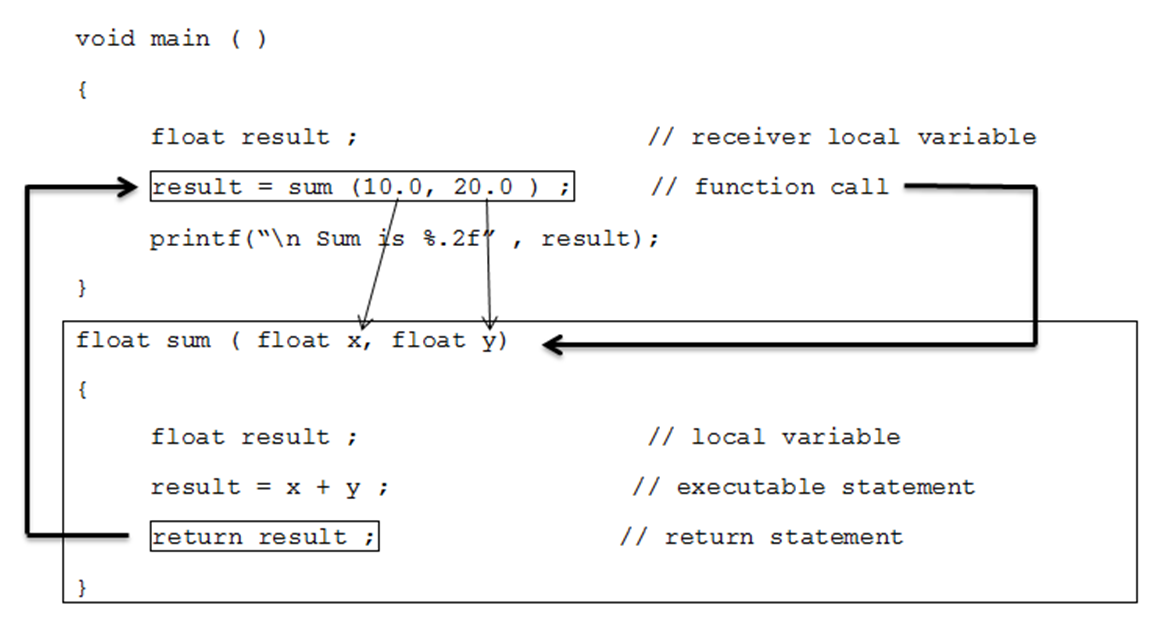- Hello everyone!. You might remember about my last post on “Introduction to Function” in which I had discussed about the what function is and what advantages it can bring. If you haven’t read my previous post yet, I strongly suggest you to read it first as this post is a supplementary for the same.
- In this post as promised I will try to explain basic elements of functions in as easy way as possible.
Elements of Functions
- Every function has the following elements:
- Function Declaration (Function Prototype)
- Function Definition
- Function Call
-
Function Declaration (Function prototype)
- Similar to variables, in C, every function needs to be declared before it can be used.
- Functions can be declared either globally (inside the main() ) or locally (outside the main() ) as per the program requirement. (You can read more on this at Structure of C Program)
Syntax:
return_type function_name( argument list ) ;- Function prototype has the following three parts:
Return type :
- It specifies return type of the function that means type of the data that a function will return such as int, float, char etc.
- Function that does not return any value will have return type as void.
Function Name:
- It is the name of the function and it should be any meaningful name.
- It should follow all naming convention rules.
- Some examples of function names are display, show, calculate etc.
Argument List:
- Argument list specifies list of all arguments required for the function to perform the desired task.
- Arguments are separated by comma. It may include both data type and argument name but normally only data type is provided.
- The following is an example of function prototype for doing sum of two float values:
Function Declaration Example
float sum ( float, float ) ; OR float sum (float x, float y) ;
- Where, int is a return type, sum is the name of the function and int x, int y are the argument list.
-
Function Definition
- Function definition contains executable block of statements.
- It can be written either before or after the main() but normally it is written after the main().
Syntax:
return_type function_name( argument list )
{
// local variable declaration ;
// executable statements ;
:
:
// return statement ;
}- The function definition contains the following two parts:
- Function Header
- Function Body
-
Function Header:
- The first line of function definition is known as function header.
- It consists of three parts: return type, function name and argument list.
-
Function Body:
- It consists of three parts: local variable declaration part, executable part and return statement.
- All the required variables are declared at the local variable declaration part.
- Executable part contains all the executable statements that performs actual task.
- return statement should be the last statement inside the function body. It is optional.
- If return type of function is void then it can be omitted but function having return type other than void must include return statement.
- Example of function definition is given below for above function declaration.
Function Definition Example
float sum ( float x, float y)
{
float result ; // local variable
result = x + y ; // executable statement
return result ; // return statement
}- Example of function without return type is as follow:
void sum ( float x, float y)
{
float result ; // local variable
result = x + y ; // executable statement
printf(“\n Sum is %.2f” , result);
return ; // return statement. its optional
}- Note : We can omit return statement if function return type is void.
-
Function Call
- A function can be called simply by using name of the function followed by a list of Actual parameters (Arguments) if any.
- The following example calls sum() function that we defined above.
void main ( )
{
float result ; // receiver local variable
result = sum (10.0, 20.0 ); // function call
printf(“\n Sum is %.2f” , result);
}- When the compiler encounters a function call, the control is transferred to the function definition and executes the function line by line and a computed value is returned with the help of return statement.
- The returned value is assigned to the receiver variable. This is illustrated as below:
- Arguments that passed in function call and arguments receiving in function definition should have the same data type.
- For example in above function call sum (10.0, 20.0) we have passed arguments of float type and inside function definition those float type arguments are received by float type variable x and y respectively. In short, type of arguments in function call and function definition should be same.
- The argument names used in function definition is known as formal parameters.

